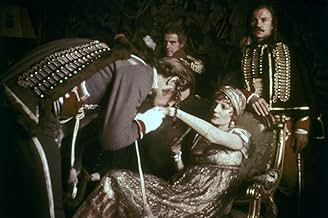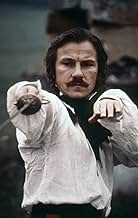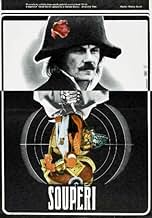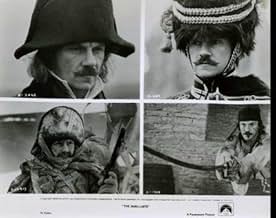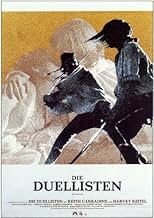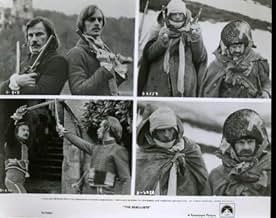अपनी भाषा में प्लॉट जोड़ेंFrance, 1801. Due to a minor perceived slight, mild-mannered Lieutenant d'Hubert is forced into a duel with the hot-headed and irrational, Lieutenant Feraud; their disagreement ultimately re... सभी पढ़ेंFrance, 1801. Due to a minor perceived slight, mild-mannered Lieutenant d'Hubert is forced into a duel with the hot-headed and irrational, Lieutenant Feraud; their disagreement ultimately resulting in scores of duels spanning several years.France, 1801. Due to a minor perceived slight, mild-mannered Lieutenant d'Hubert is forced into a duel with the hot-headed and irrational, Lieutenant Feraud; their disagreement ultimately resulting in scores of duels spanning several years.
- निर्देशक
- लेखक
- स्टार
- 2 BAFTA अवार्ड के लिए नामांकित
- 2 जीत और कुल 4 नामांकन
फ़ीचर्ड समीक्षाएं
The basis was simple and commanding: The adaptation of the classic Joseph Conrad story 'The Duel'. The result is a lesson in perfect cinematic storytelling. And it's also a lesson in the forgotten art of low budget moviemaking. Not a single frame suggests that 'more' would've been better. The required economy of every single aspect of production always finds its perfect answer in the execution of the story. What you can't see or hear doesn't need to be there. It's as simple as that. Suffice to say, Ridley Scott being the director he is, The Duellists is visually superb and at the same time devoid of a single frame just being there to look good. His visual style is completely dependent on the substance of the story as well as the acting. That becomes blindingly obvious in his weaker films, where he resorts to 'beautifying' an empty shell. No other great director is as much a slave of the story's quality, before he can become its master. But once a strong moment, a powerful dialogue, a strong character hits his senses, he 'translates' their life into his unique visual language. In that he is almost without comparison. What we sometimes later perceive as only beautiful is always as essential to the story as a note in a symphony is essential to the next one to make 'sense'. The almost hauntingly arcadian, rural opening shot of the movie is a perfect example. The little girl with her geese leads us through innocence and peace across the screen... and bumps with us into the towering Husar blocking the path. No words. Just eyes making the girl lead her geese away from the path, away from what the Husar is guarding against unwanted onlookers. We're already hooked into the story on more than one level, and the cut to the duellists on the open field tells us where paradise ends. That's Ridley Scott in his purest form. The beauty of his style is in fact visual drama, and the power of his language is as visible now as it was in 1977. In 'Gladiator', watch the transition from Maximus's cornfild dream to the tortured earth of the battlefield in Germania and you'll see what I mean. That's why Scott is also an actor's director. He always makes sense to them and the characters with every move of the camera and sets them in the best possible light for what's required. He likes good actors, which isn't as normal as one might think. There isn't a hollow second to be found in each and every performance on The Duellists. That the casting is flawless down to the last extra helped, of course. All this explains much of the ageless quality of the movie. No hollow set pieces to 'jazz it up a bit'. Only authentic locations and no built sets. Costumes, makeup, props... everything totally convincing and fitting to the period. It's virtually impossible to determine the movie's age without knowing the actors. Scott turned an ageless story into an ageless movie. An excellent script and extremely good acting all round helped him do it.
For me The Duellists is the first of 3 consecutive masterpieces (the other two are, of course ALIEN and Blade Runner), unrivalled since John Huston's first 3 films.
10 out of 10 Ulrich Fehlauer
And the immersive world. Scott usually aims for this, and this is from a time he did it well. He takes from Kubrick the idea of natural light that, once the camera locks in, will look and move (and slightly breathe) like a Romantic painting. The era is Napoleon's, and at least the wintry march back from Russian defeat provides opportunity for some astonishing images.
Some words exhaust their meaning, when thrown without care; so it's not enough to call this existentialist. The story is that an army officer bears an inexplicable grudge that spans 20 years and half of Europe.
Everything you need to know is in the last scene, expertly executed. The idea is that something deeply not-logical gnaws and eats at man's soul and sniffs for blood. And that men, this is strictly male, have lived with this aspect of self for so long, we have developed separate not-logical tools that allow us to not only instinctively respond to the call, however reluctantly, and in spite of recognition of how insane it is, but to silently respect and defend it as its own kind of logic (in our case, the concept of honor).
In the last scene, we have two men seeking each the other to eliminate him from existence, as simple as that. It's the oldest game men have played, and the same thrill resurfaces across poker tables and football. It's got to have something of death in it, if it is to matter at all.
And I have a book called Bushido: The Soul of Japan here with me, retrieved from a shelf because the film sparked an interest, that explains how the blade is the samurai's extension of soul and imbued with the same discipline.
The two rivals have fenced for the entire film, but settle on pistols for the deciding duel, and wander about in a forest, two shots each, meaning they will be able to instantly discharge what is in their soul.
Each man in the shot he takes reveals who they are, one of them rash and impertinent, and fires first, they other level-headed and reserved. The subtle context of the scene is that politics do decide war from afar, in our case the slippery (faulty) pair of boots of the aristocratic boot-maker.
Which is, in a third level, a beautiful way of putting the subtle discord strummed by the universe that creates a slippery world and illogical selves of us, dumb chance as fate.
And suffice to say, the film is British, so you will not learn it here, but in spite of the probably British-started legend, the French are historically the best tactical warriors in Europe. There is a reason why nearly every word in the modern lexicon of war is originally French, and that includes honour.
It deals with the mores and prejudices of the time it was made. The costumes are done without attention to detail or the hair-styles of the leading actors don't belong to the time when the movie is supposed to be taking place.
Not this movie.
It deals with timeless themes: courage, fate, inevitability,
honor. The costumes are impeccable, and even the hair-styles change as time progresses, exactly as the fashions changed during the times of the Napoleon. Without knowing the actors (though the cast is composed of excellent, justifiably famous artists), there is no way to tell it was made in 1977. It might have been made yesterday, or it might have been filmed on the spot.
If you enjoy a movie where attention was paid to every detail to make it a true piece of art, if you enjoy dramatic photography thoughtful themes, and just the barest suggestion of dry humor, this is the movie for you.
क्या आपको पता है
- ट्रिवियाSir Ridley Scott said that after having directed anywhere from 1,500 to 2,000 television commercials, he realized no one was going to approach him about directing a film, so he'd have to take the lead. Since his funds were limited, he used a public domain source for the story, and commissioned the script for this movie on his own.
- गूफ़(at around 1h 23 mins) Faraud, loading his pistol, drops a ball into the barrel and then rams it into place. When the ball drops,a metallic sound is heard, indicating that there is no powder in the barrel.
- भाव
Armand D'Hubert: General Feraud has made occasional attempts to kill me. That does not give him the right to claim my acquaintance.
- क्रेज़ी क्रेडिटOpening credits prologue: STRASBOURG 1800
- कनेक्शनFeatured in Moviedrome: Double Bill - The Duellists/Cape Fear (1991)
- साउंडट्रैकBist du bei mir
(uncredited)
Music by Gottfried Heinrich Stölzel
from "Notenbüchlein für Anna Magdalena Bach No. 25. BWV 508"
Written by Johann Sebastian Bach (uncredited)
टॉप पसंद
विवरण
- रिलीज़ की तारीख़
- कंट्री ऑफ़ ओरिजिन
- भाषाएं
- इस रूप में भी जाना जाता है
- The Duellists
- फ़िल्माने की जगहें
- Château de Commarques, Dordogne, फ़्रांस(final pistol duel)
- उत्पादन कंपनियां
- IMDbPro पर और कंपनी क्रेडिट देखें
बॉक्स ऑफ़िस
- बजट
- $9,00,000(अनुमानित)
इस पेज में योगदान दें




